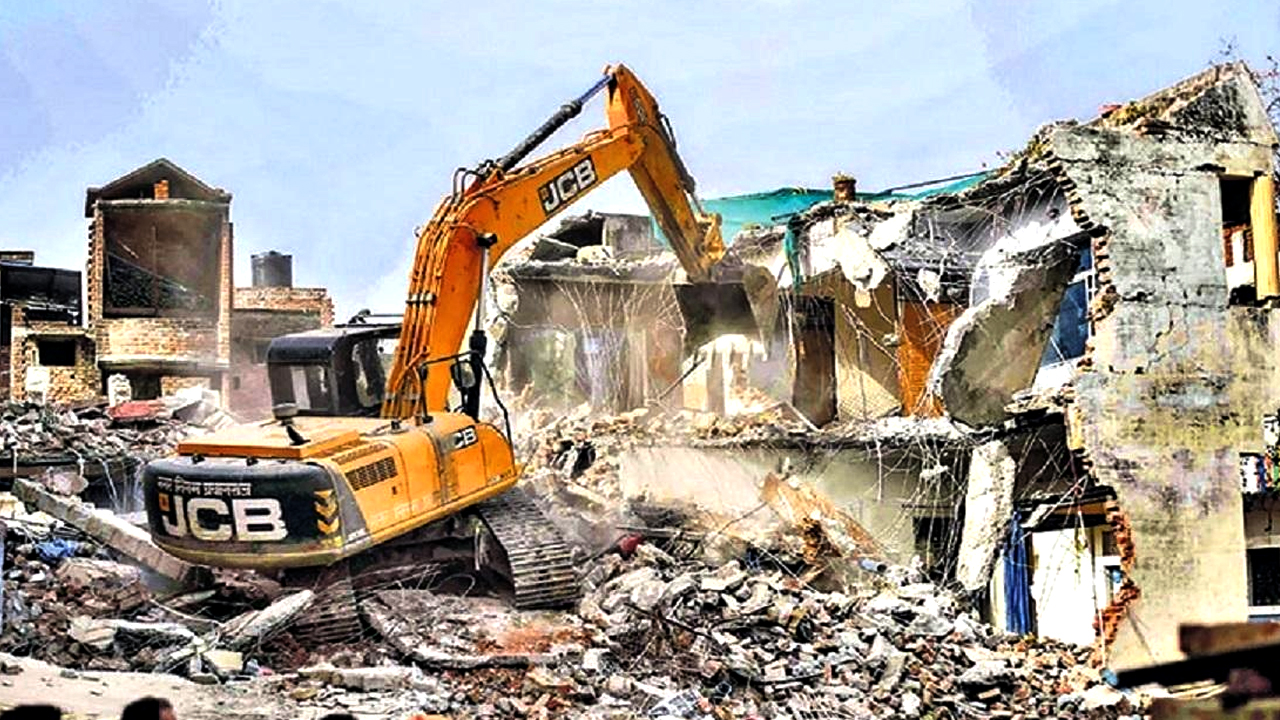A report released on Monday by the Housing and Land Rights Network (HLRN) reported that 7.4 lakhs people were evicted and 1.5 lakh houses destroyed in demolition drives across India between January 2022 and December 2023. Major reasons for evictions include anti-encroachment drive, beautification & infra projects.
Groundxero| March 5, 2024
The Housing and Land Rights Network (HLRN), in its latest report released on Monday (March 4) titled “Forced Evictions in India: 2022 & 2023” highlights the unmitigated crisis of forced evictions in India. The report, which is the sixth in the series of HLRN’s annual reports on evictions, reveals a record increase in the number of home demolitions in India and documents the grave impact of forced evictions on the urban and rural poor in the country.
Over the last seven years, data collected by HLRN has demonstrated the extent and magnitude of the crisis of forced evictions in India and highlighted the impacts on over a million affected persons. From 2017 when HLRN began to record eviction data to 2023, over 1.68 million or 16.8 lakh people have been forcibly evicted across India.
The new report by HLRN indicates that the situation has only worsened in the last two years, and the persistent acts of home demolition by state authorities deprives the affected persons, who are already marginalized, from accessing the most basic facilities, essential for a life with dignity. It leads to a rise in homelessness, landlessness, and impoverishment in the country.
Key Findings from HLRN’s Report:
- In the last two years (1 January 2022 to 31 December 2023), over 1.5 lakh houses were demolished by state authorities in India—at the central, state, and local levels—thereby, resulting in the forceful eviction of about 7.4 lakh people from their homes.
- Demolitions occurred at an unprecedented pace and magnitude in 2023, and the year witnessed the highest number of demolition of homes and forced evictions recorded by HLRN in the last seven years since it began publishing this series of annual reports. In 2023, at least 515,752 (5 lakh) people across the country were forcefully evicted and over 107,449 homes demolished by various authorities.
- In 2022 about 46,371 houses were demolished and at least 222,686 people were forcibly evicted from their homes across rural and urban India. This means around 129 houses were destroyed daily and 25 people were evicted every hour on an average. While, in 2023, about 107,449 houses were demolished, and at least 515,752 people were forcibly evicted. This translates into 294 houses destroyed daily and 58 people evicted every hour on an average.
According to the report, in 2022 and 2023, at least 31 per cent of affected persons, where information is available, belong to historically marginalized groups, including, Scheduled Castes, Scheduled Tribes, Other Backward Classes, nomadic communities, migrant workers, and religious minorities. In both years, the highest percentage of people (58.7 per cent) – were evicted under the guise of ‘slum’ clearance/‘encroachment’ removal/‘city beautification’ initiatives. Evictions were carried out for a range of other reasons, including:
- Infrastructure and purported ‘development’ projects (35 per cent of affected persons);
- ‘Environmental’ projects, forest protection, and wildlife conservation (4.7 per cent of affected persons);
- ‘Disaster management’ efforts (0.7 per cent of affected persons); and,
- Other reasons such as village conflicts, and demolition of government-constructed housing units (0.9 per cent of total population affected).
The report reveals that the National Capital Territory of Delhi recorded the most incidents of evictions (78) in 2022 and 2023. In 2023, around 2.8 lakh people were evicted by various state authorities in Delhi, the highest in any location in India in the year.
The report says that in the majority of instances where information was available (82 per cent in 2023 and 58 per cent in 2022), no rehabilitation was provided by the state to the affected persons. Also, in nearly all documented cases of forced eviction, state authorities have not complied with due process requirements laid down by the Indian courts and international human rights standards and guidelines, including the United Nations (UN) Basic Principles and Guidelines on Development-based Evictions and Displacement. Consequently, all incidents of forced eviction resulted in multiple human rights violations.
HLRN estimate that nearly 17 million people continue to live under the threat of eviction and displacement across India, for various reasons. Given the severity and magnitude of this worsening eviction and displacement crisis, HLRN has proposed the following urgent recommendations to the central and state governments:
1) Impose an immediate moratorium on evictions for any reason.
2) Ensure that due process is followed, and free, prior, and informed consent of all affected persons is taken before any eviction/relocation/redevelopment/in situ upgrading project is finalized. Issue standard operating procedures for all government agencies to follow before carrying out any act of demolition, based on prominent judgments of the High Court of Delhi (Sudama Singh; Ajay Maken) and United Nations (UN) Basic Principles and Guidelines on Development-based Evictions and Displacement. 3) Strictly ensure that demolitions are not used by state authorities against communities as a means of meting out summary punishment.
4) Urgently provide rehabilitation/alternative accommodation to all evicted families, including those eligible families who have been waiting to be rehabilitated for years. Justice delayed is justice denied!
5) Recognize and list all informal settlements as legitimate clusters of housing to remove connotations of ‘illegality’ and ‘encroachment’, that adversely affects the residents and results in forced evictions.
6) Recognize and uphold the right to adequate housing and land of urban and rural communities.
The report is available at:
https://hlrn.org.in/documents/Forced_Evictions_2022_2023.pdf

